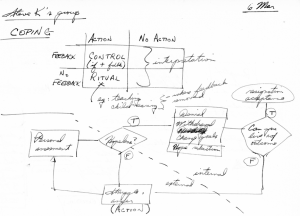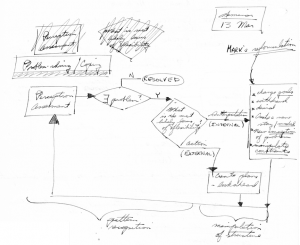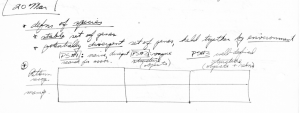Steve Kaplan was a professor of mine at the University of Michigan during graduate school, and ultimately co-advised my dissertation (with Paul Scott). Thinking of him caused me to look through old notes, and form this recollection.
“5+/-2” papers were about the only required assignment in many of Steve’s classes. They needed to fit on one side of one piece of paper, and could only attempt to make that many themes. Not only was this a brilliant exercise in minimizing the actual number of pages Steve had to grade, but proved a very useful, difficult constraint to satisfy.
5 +/- 2 Themes from Steve Kaplan
- You can’t say everything, certainly not all at once. If you are trying to convey something to others, provide an ordered progression through the constituent bits. Take the most important path connecting them first, waving at alternative routes you can take next time as you go by. Even your description of the important bits has to be a cartoon on first presentation, sketch it and move on. By the time you reach the end your audience should have a much better sense of the lay of the land, and you can puzzle out your next hike together. Two-by-two diagrams, even flow charts can be spatially excellent ways to map our ideas. See Coping, Problem-Solving and Species examples below.
- Doing science is like all other worthy activities in that you had better have a good reason for doing whatever it is that you’re doing, or you’re going to do a bad job at it. Connecting your particular scientific question to your personal motivations for asking them is critical, before spending huge effort and the resources of many others on the scientific tasks. Because if you are lucky and actually learn something from your experiments, you’re immediately going to need to figure out what the implications might be. And most of the rest of the time, when it’s a negative result, or the question was bad or the answer turns out to be obvious or just not so exciting, you’ll have to pick yourself back up and figure out whatever is to be the next worthwhile question.
- I was raised Unitarian, and Steve is definitely Old Testament. There was a moral certainty to Steve’s view that was something to behold, as if a beam of light broke through the clouds just behind his right ear. But his certainty also came with a bemused kindness for all the ways kids can screw up, so his reactions rarely seem harsh. We are all muddling, but let’s do what we can to keep it from being a random walk.
- Celebrate the natural environment! It makes us who we are, and we take it for granted at our peril. Much of modern life and design can destroy what is most joyful about nature, often out of ignorance and neglect. As designers, as citizens, as mammals on the planet, we need to do all we can to nurture nature.
- Developing expertise causes blindness. Improved attention with a disciplined view of one topic comes at the expense of becoming less attentitive to much of the rest of the world.
- I can only think of Steve as part of the constellation of others with whom he worked. Rachel, of course. But John Holland and Paul Scott also seem, for me, post hoc, like they were all destined to work together. John and Steve shared an irreverant, iconoclastic “us vs. them” approach to academic debate.
- Coping (March 6, 1981)
- Problem-solving (March 13, 1981)
- Species (March 20, 1981)



